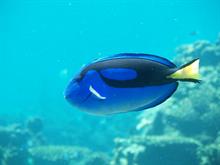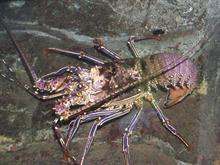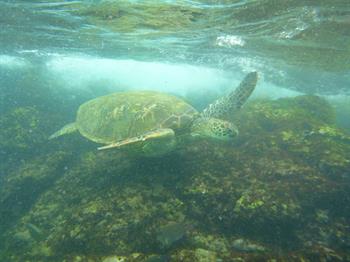Marine Biology and Management Course - study by distance learning.
Study by Distance Learning with this 600 hour course.
- Foundation studies for people working or wishing to work in marine conservation, tourism or research.
- With this 600 hour course you will gain detailed knowledge for understanding the biology and management of marine animals.
Do you want to work with marine animals or within the tourism industry?
 Develop your knowledge of marine environments and sea life underpins many different types of jobs, and businesses, including:
Develop your knowledge of marine environments and sea life underpins many different types of jobs, and businesses, including:
- Fishing
- Aquaculture
- Diving
- Marine Conservation
- Marine Tourism
Aquarium Management (from pet shops to sea life parks)
- Research, Education, and more.
How do I get a job in Marine Science?
These jobs are highly sought after and difficult to obtain. To gain employment you must actively market your skills and present yourself well to prospective employers.
Employers generally seek potential employees who already have substantial existing knowledge and skills, as it requires time and a large financial commitment to train new employees. If you already have these skills it will increase your competitive position in the job market.
If you are seeking to work in these industries, we often find people who with a qualification, such as this certificate, together with an Open Water Divers License and Boat License improve their chances of employment. This course provides students with the knowledge and practical skills to work or plan a career in marine biology, or marine environmental management. This is a foundation entry level course to develop valuable skills for working in the field of marine research and management.
COURSE STRUCTURE AND CONTENT
Course Duration: 600 hours.
Start Date: Start at any time - study at a pace that suits you, and with full tutor support for the duration of your studies.
Course Composition: Students are to study the 3 Core Modules plus 3 Elective Modules (6 Modules in total).
The Core Modules are: Marine Studies I, Earth Science, Marine Studies II.
The Elective Modules available to choose from are:
Research Project I,
Workshop I,
Marine Aquaculture,
Research Project II,
Ecotourism Guide Course,
Environmental Assessment.
THE CORE MODULES
These modules provide foundation knowledge for the Qualification - Certificate in Marine Studies.
Marine Studies I BEN103
 A 9 lesson module which is concerned with study of marine ecology systems. Students will learn about the environments in which marine life exists, including nutrient cycles, and food chains. Those completing this module will be able to identify the different characteristics of marine environments, and the different types of marine life supported within these. The module includes lessons specific to Shellfish and Crustaceans, Squid and Octopus, Cartilaginous and Bony Fish, Marine Mammals, Turtles and Sea Snakes, and Seabirds. The final lesson in the module looks at the human impact on marine environments, as well as considering techniques used to manage stocks of fish and other farmed marine life.
A 9 lesson module which is concerned with study of marine ecology systems. Students will learn about the environments in which marine life exists, including nutrient cycles, and food chains. Those completing this module will be able to identify the different characteristics of marine environments, and the different types of marine life supported within these. The module includes lessons specific to Shellfish and Crustaceans, Squid and Octopus, Cartilaginous and Bony Fish, Marine Mammals, Turtles and Sea Snakes, and Seabirds. The final lesson in the module looks at the human impact on marine environments, as well as considering techniques used to manage stocks of fish and other farmed marine life.
The 9 lessons are:
- Marine Ecology Systems
- Shallow Waters & Reefs
- Shellfish & Crustaceans
- Squid, Octopus, and Other Primitive Animals
- Fish Part A (Cartilaginous Fish) Sharks, Eels, Rays
- Fish Part B (Bony Fish)
- Marine Mammals
- Turtles, Sea Snakes and Seabirds
- Human Impact on Marine Environments and Fishing
Marine Ecology BEN304
Ten lessons as follows:
- Scope and Nature of Marine Ecology
- Biodiversity of Marine Environments
- Environmental Factors of Marine Environments
- Climate Change & Other Anthropogenic Pressures
- Restoration of Natural Marine Ecosystems
- Managing Threatened Species (Practical and Regulatory Approaches)
- Managing Fisheries in Marine Ecosystems
- Marine Resources and Sustainability
- Technology
- Data in Marine Management
Marine Studies II BEN203
The module comprises 10 lessons looking at marine plants, and a wide range of marine organisms. Lessons focus on a variety of different organisms, including – Cnidarians and Worms, Arthropods, Molluscs, Echinoderms. Students will have the opportunity to study the classification, characteristics, lifestyle and behaviour of a such organisms.
The 10 lessons are:
- Introduction and Simple Organisms
- Marine Plants
- Cnidarians And Worms
- Arthropods
- Molluscs
- Echinoderms
- Non Bony Fishes
- Bony Fishes I
- Bony Fishes II
- Marine Mammals and Higher Animals
THE ELECTIVE MODULES
In addition to the core modules, students are to study a further three elective modules.
Research Project I BGN102
Students will learn to plan and conduct research into the current status of an aspect of the equine industry relating to their area of study, and complete a descriptive report based on that research.
Workshop I BGN103
Develop your capacity to identify, select and apply knowledge and skills to appropriate perform workplace tasks in your industry through a problem-based learning project. The 3 lesson module identifies 3 areas of study, covering workplace tools and equipment, workplace skills, and workplace safety. The approach of problem-based learning (PBL) enables students to consider and resolve hypothetical problems which mimic those that may occur in real world situations. This helps to equip students with the skills and confidence to approach and resolve problems that they may encounter through their work. It provides added benefits in areas such as planning and assessment by equipping students with the ability to effectively plan, view, and outline their intended outcomes in areas of work and projects that they may be engaged in.
Earth Science BEN204
A 9 lesson module where students will learn about the science behind current environmental issues such as global warming and greenhouse gasses, investigate the complex interactions that drive climate and environmental conditions throughout the world. The module will develop a student's ability to identify and describe the Earth, its structure and explain the processes that affect change in the structure and composition of the earth. Learn about rocks and minerals, meteorology, global weather patterns, the oceans, surface chances (e.g. earthquakes and volcanoes), geological time and more.
The 9 lessons are:
- Structure and Forces
- Rocks and Minerals
- Surface Changes
- The Oceans
- Air and Weather
- Global Weather Patterns
- Geological Time
- Modern Environmental Issues
Marine Aquaculture BAG220
An 11 lesson module which looks at the farming of salt water species of fish, shellfish, seaweed, and other marine products. Students will study aquaculture production systems and the operation of a Mariculture business. The course looks at the selection process for choosing a species, dietary considerations, the management of health and harvesting.
Research Project II BGN201
Students will hone the research skills obtained in Research Project I and learn specialised techniques to improve the value of their reports to business and industry. Students will select an industry or business that interests them and explore the research needs of the organisation in a real workplace setting. The module will develop your skills to plan a research project and how the plant can be implemented in order to maximise the value of the information collated. Students will then use this information to produce a descriptive report that could be very valuable to the development of an organisation’s business and operational practices.
Ecotourism Tour Guide Course BTR301
A 10 lesson module which develops a students ability to organise and conduct ecotourism services including tours and activities. The module considers a wide range of subjects concerning ecotourism guiding including environmental awareness, planning tours, displays and interpretive aids, plant and animal interpretation.
Environmental Assessment BEN301
This 8 lesson module looks at the assessment and production of reports relating to specific environmental impacts or projects. It covers the different types of employment available along with the both International and Domestic Environmental Law. The module looks at the process of assessment and the writing of reports. It is completed with a Project Based Learning Project where the student will apply their knowledge and carry out a small environmental assessment which they will write up as a professional report.
Note that each module in the Certificate in Marine Studies is a short course in its own right, and may be studied separately.
HOW THE CERTIFICATE IS ASSESSED
The Certificate In Marine Biology requires around 600 hours of study. This is made up of six 100-hour modules.
To pass the course –
- Pass all assignments on the six 100-hour modules. There will be an assignment at the end of each lesson to submit to your tutor for marking and feedback.
- Pass six examinations – one on each module. These are usually taken at the end of the module and can be arranged at a time and location to suit you.
STUDY WITH ACS
At ACS we provide you with more than just a set of course notes.
Your 'learning package' includes:
- Course notes.
- Self-assessment quizzes.
- Assignment feedback.
- You can interact one on one with a professional tutor with decades of experience - just email, phone or log on to chat to connect with them.
Explore Another World
 The world beneath the sea is for most people "out of sight", "out of mind". It is mysterious, and full of animals and plants that go well beyond what most people might imagine.
The world beneath the sea is for most people "out of sight", "out of mind". It is mysterious, and full of animals and plants that go well beyond what most people might imagine.
As with land environments, there are diverse ecosystems beneath the sea, and to maintain those ecosystems and the biological populations within them, we need to understand the animals, plants, environments and relationships that bind these components together.
Marine plants are mostly algae; but there are also flowering plants. Marine animals include small single celled organisms, through to the largest animals in existence.
Consider Marine Crustaceans
The Phylum Arthropoda includes the land-dominating insects, spiders, millipedes and centipedes. The Phylum is huge, outnumbering all other animal groups combined to a ratio of three to one. The group includes well known representatives such as lobsters, shrimps and crabs but also a wealth of microscopic organisms that form a large portion of both the planktonic and benthic fauna (bottom dwelling). Crustaceans are incredibly diverse with regards to size, shapes, colours and lifestyle.
Crustaceans have a segmented body; generally, the front (cephalothorax) and back (abdomen). The limbs are jointed and capable of moving in all directions due to internal muscular attachment. These legs serve a variety of functions that include locomotion, touch, and chemical reception, respiration, and feeding. The most conspicuous of these are the walking legs, antennae (two pair in contrast to the single pair of other arthropods), and pincer-like claws or nippers typical of crabs and shrimp.
The majority of crustaceans are known as decapods (meaning 10 legs). Shrimps, lobsters and crabs are members of this group. For the most part they are secretive creatures that remain hidden for long periods in burrows or crevices. Decapods have the last five pairs of thoracic appendages modified as walking legs while the first three pairs, the maxillipeds, function as mouthparts. If one pair of walking legs has enlarged pincers (chelae) they are referred to as chelipeds. The sensory organs are located on antennae, allowing the animal to taste and smell. Marine arthropods form an integral part of the food chain, being actively hunted by larger predators, mainly fishes.
The best time to see crustaceans is at night when many species emerge from their retreats to feed. There are few bottom foraging predators at this time, but there is still an element of risk.
Arthropods (ie. the phylum Arthropoda) as a group, contains the largest number of living species, and in terrestrial environments includes the insects and spiders. In marine environments, arthropods are mainly in the subphylum Crustacea, which includes shrimps, crabs and lobsters.
Learn about Bony Fish - and a whole lot more
Bony fish are the first animals we tend to think about in marine environments. In part, this is because they are the most diverse and prolific group. They include 98% of all fish species. Bony fish belong to the taxonomic Class Osteichthyes. There are other types of fish (e.g. sharks) and lots of other types of marine animals to also learn about. This courses gives you an overview of them all, and once you understand the fundamental similarities and differences between various types of marine animals, you then have a sound basis upon which to grow your knowledge and understanding of marine biology after your studies are completed.
The bony fish have the most complex head skeleton of all types of fish, with complete dermal (skin) skeletons of small to medium size bones (scales). They have internal gills in one chamber that are protected by a bony operculum. Their internal skeleton is composed, at least partly, of true bones. Fins have rays, sometimes they are spiny. Most species have a swim bladder. The salt and water balance is maintained by kidneys. Fish of this class inhabit both seas and fresh waters and many species migrate between seas and rivers in their life cycle.
Job Opportunities in Marine Industries
Marine based industries are significant in coastal areas all around the world.
More people will work in Marine Tourism, Fishing, Boating and Diving than in Marine Research or Conservation.
Graduates can find work opportunities arising in a very wide range of areas, including Marine Biology and Conservation Management. To get the job you want though; sometimes you need to take work you might not want at first, to simply get a start in the industry. This is in fact the same in any industry!
There is high competition for jobs as marine scientists, however if a Marine Biologist has varied experience and qualifications it will increase their opportunity of finding a job as they can apply for a wider range. Possible occupations include:
- Field Researcher
- Aquarium Assistant
- Ecotourism Expert Guide
- Marine Park Manager
- Lecturer/Tutor
- Marine Planner
- Environmental Consultant
Where Could you Work?
- Government Agencies
- Ecotourism Tour Operations
- Universities and Colleges
- Private Sector (e.g. marine resource companies)
- Self-employed (e.g. Consultant)
- Aquariums
- Wildlife Conservation Organisations
This course offers a great starting point with a broad range of studies for the student.
LEARN MORE -
If you have any questions, please do get in touch with us - connect with our expert tutors, use our FREE COURSE COUNSELLING SERVICE.